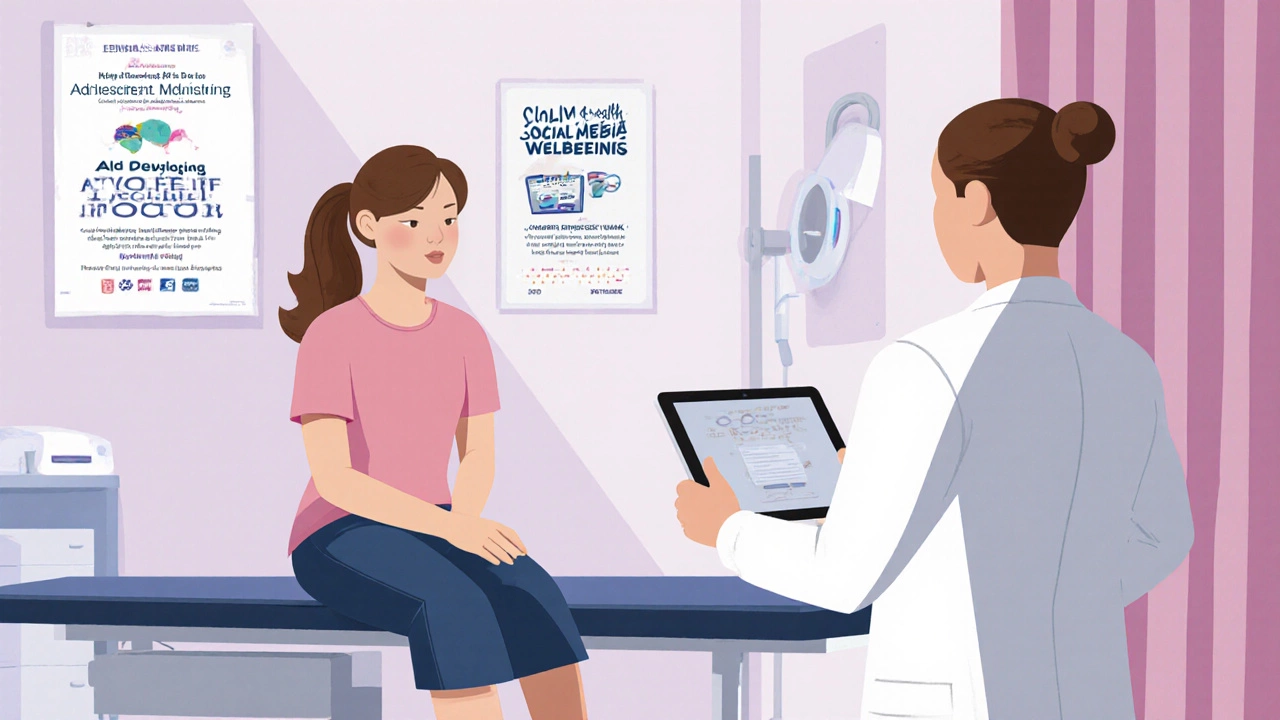Oct
8

- by Dhruv Ainsley
- 0 Comments
Doctor Type Finder for Girls
When it comes to a daughter’s health, finding the right professional can feel like a maze. Doctor for girls is a broad term that covers several specialties, each designed for specific age ranges and health needs. This guide breaks down the most common types, points out what to look for, and shows how to pick the best fit at every stage of her life.
Key Takeaways
- Young children (0‑12) usually thrive under a pediatrician’s care.
- Pre‑teens and early teens may benefit from a family doctor or adolescent medicine specialist.
- From mid‑teens onward, a gynecologist becomes important for reproductive health.
- Consider the doctor’s communication style, gender comfort, and expertise in girls’ health issues.
- Use local health directories, parent referrals, and school nurse recommendations to find qualified providers.
1. Pediatrician: The First Line of Care (Birth‑to‑12 Years)
Pediatrician is a medical doctor who specializes in the physical, emotional, and social health of children from birth through early adolescence. Typical services include newborn screenings, vaccination schedules, growth‑monitoring, and managing common childhood illnesses. Because they train exclusively with children, they know how to talk in a kid‑friendly way and create a calm exam environment.
Key attributes:
- Board‑certified in pediatrics (often highlighted on clinic websites).
- Experience with age‑specific concerns such as ear infections, asthma, and developmental milestones.
- Often offers extended hours to accommodate school schedules.
When to switch: Around age 11‑12, when your child starts hitting puberty, you may begin to consider a transition to a family doctor or adolescent specialist for more focused teen health care.
2. Family Doctor (General Practitioner) for Girls
Family doctor (or general practitioner) provides comprehensive primary‑care for patients of all ages, including girls transitioning from childhood to adolescence. They manage routine check‑ups, vaccinations, minor injuries, and chronic conditions like diabetes or allergies. Because they see the whole family, they can coordinate care across generations, which many parents find convenient.
Advantages:
- One‑stop shop for the whole household.
- Continuity of care if you’ve already built trust with them during your own childhood.
- Often familiar with local schools and community health resources.
Potential gaps: Some family doctors may have limited training in adolescent mental health or reproductive issues, so you might still need a specialist for those areas.

3. Adolescent Medicine Specialist: The Teen‑Focused Expert
Adolescent medicine specialist is a pediatrician or family doctor who has completed a fellowship in adolescent health, focusing on the unique physical, emotional, and social challenges of teenagers. They handle puberty‑related concerns, mental health screening, eating disorders, and confidential sexual health counseling.
Why consider them?
- They are trained to discuss sensitive topics without parents feeling excluded.
- They stay updated on issues like vaping, social media pressure, and gender identity.
- Often work in teen clinics attached to hospitals or university health centers.
Typical age range: 12‑19 years.
4. Gynecologist (OB‑GYN) for Girls: When Reproductive Health Takes Center Stage
Gynecologist (obstetrician‑gynecologist) specializes in the female reproductive system, covering everything from menstrual disorders to fertility. For girls, the first visit usually occurs around age 13‑15, or earlier if there are menstrual concerns.
What to expect:
- A private, confidential setting where the doctor discusses periods, contraception, and HPV vaccination.
- Physical exam focused on pelvic health, which can be uncomfortable for first‑timers-choosing a doctor who is gentle and experienced with teens is crucial.
- Screening for STIs and counseling on healthy relationships.
Choosing the right gynecologist often involves looking for practitioners who list “adolescent gynecology” as a focus area.
5. Nurse Practitioner & Physician Assistant: Flexible Gateways
Nurse practitioner (NP) and physician assistant (PA) are licensed clinicians who can diagnose, treat, and prescribe under the supervision of a physician. Many clinics employ NPs and PAs to provide routine well‑child visits, vaccination updates, and minor illness management.
Benefits:
- Often have longer appointment slots, allowing more conversation time.
- Can be more cost‑effective, especially under public health plans.
- Many specialize in pediatrics or women's health, making them a solid backup when a physician’s schedule is full.
6. How to Compare Doctor Types: Quick Reference Table
| Specialty | Typical Age Range | Core Focus | When to See First | Key Credential |
|---|---|---|---|---|
| Pediatrician | 0‑12 years | Growth, vaccinations, common childhood illnesses | Birth or first well‑child visit | Board‑certified in Pediatrics |
| Family Doctor | All ages (often 0‑18 for girls) | General health, chronic condition management | When you want one provider for the whole family | Board‑certified in Family Medicine |
| Adolescent Medicine Specialist | 12‑19 years | Puberty, mental health, confidential sexual health | Early teen years or if specific teen issues arise | Fellowship in Adolescent Medicine |
| Gynecologist (OB‑GYN) | 13‑18 years (or earlier for menstrual problems) | Reproductive health, menstrual disorders, STI screening | First menstrual irregularities or at age 13‑15 | Board‑certified in Obstetrics & Gynecology |
| Nurse Practitioner / Physician Assistant | All ages | Routine exams, vaccinations, minor illnesses | When a physician’s slot is unavailable | Advanced practice certification in Pediatrics or Women’s Health |

7. Practical Tips for Choosing the Right Provider
- Check credentials. Look for board certification, years of experience, and any subspecialty focus on girls or adolescents.
- Assess communication style. During the first call or visit, note whether the doctor uses language your daughter understands and whether they encourage questions.
- Consider gender comfort. Some families prefer a female doctor for reproductive health topics; others value a doctor who respects the child’s preferences regardless of gender.
- Location and hours. Proximity to school or home can make appointments less stressful. Flexible after‑school hours are a plus.
- Insurance coverage. Verify that the provider is in‑network for your health plan to avoid surprise bills.
- Seek parent referrals. Talk to other parents, school nurses, or local parenting groups for personal experiences.
- Visit the clinic beforehand. A quick tour can reveal how child‑friendly the waiting area is and whether staff treat children with respect.
8. Building Trust with Your Daughter’s Doctor
Even the best‑qualified doctor won’t be effective if your daughter feels uneasy. Here’s how to nurture a positive relationship:
- Invite her to ask questions before the appointment; write them down if needed.
- Practice the “tell‑show‑do” approach: the doctor explains, demonstrates, then performs the exam.
- Encourage her to voice any discomfort during the visit; a good doctor will pause and adjust.
- Follow up after each visit to discuss what happened and reinforce any health advice.
9. When to Switch Providers
Medical needs evolve, and so should the provider. Consider changing if:
- The doctor consistently dismisses her concerns.
- Wait times become unmanageable, affecting school attendance.
- Specialized care is needed that the current provider can’t offer.
- Your daughter expresses mistrust or anxiety that you can’t resolve.
Transitioning is easier when you have a copy of her health records; most clinics can email or fax them securely.
Frequently Asked Questions
At what age should my daughter first see a gynecologist?
Most pediatricians recommend the first gynecology appointment between ages 13 and 15, or earlier if she experiences irregular periods, severe cramps, or other menstrual concerns.
Is a family doctor enough for my teen’s mental health needs?
Family doctors can screen for anxiety and depression, but a specialist in adolescent medicine or a child‑psychologist often provides deeper expertise, especially for complex issues.
Can a nurse practitioner handle my child’s vaccinations?
Yes, NPs and PAs are fully authorized to administer vaccines and keep immunization records, provided they work within a licensed clinic.
What should I ask during the first visit to an adolescent medicine specialist?
Ask about their experience with puberty‑related issues, confidentiality policies, how they involve parents in care, and whether they offer counseling for body image or social media stress.
How do I know if a doctor’s office is child‑friendly?
Look for bright waiting rooms, child‑size examination tables, toys or books, and staff who greet kids by name. A short pre‑visit tour can confirm these details.
Choosing the right doctor for girls isn’t a one‑size‑fits‑all decision. By matching age, health needs, and personal comfort with the right specialty, you set the stage for a lifelong partnership built on trust and good health.





